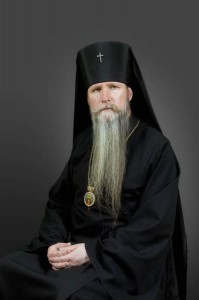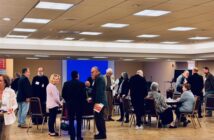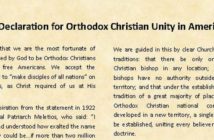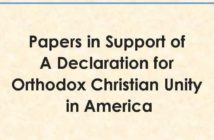Source: Pravmir.com
Originally posted on January 16, 2014
From the Editors: On Tuesday, December 9, 2013, the Synod of Bishops of the Russian Orthodox Church Outside of Russia, during a regular meeting, deliberated on the results of the previous September’s Assembly of Canonical Orthodox Bishops of North and Central America. During the discussion regarding the proposal to reorganize the Orthodox dioceses in North and Central America, the President of the Synod of Bishops stressed that the Russian Church Abroad is under the canonical authority of its dear and great Mother, the Russian Orthodox Church, and is obligated to minister to its multitude of devoted flock finding itself abroad and wishing to remain in her bosom. The members of the Synod of Bishops, agreeing with the opinion of their President, noted that Orthodoxy in America is not prepared for reorganization of Orthodox dioceses in America. In connection with this, the Synod of Bishops instructed its Secretary, His Eminence Archbishop Kyrill of San Francisco and Western America, to send the following letter to the President of the Assembly of Canonical Orthodox Bishops of North and Central America explaining the position held by the hierarchs of the Russian Orthodox Church Outside of Russia in this matter.
To: The Most Reverend Archbishop Demetrios
Chairman of the Assembly of Canonical Orthodox Bishops in North and Central America
Your Eminence!
During our recent Fourth Assembly of Canonical Orthodox Bishops of North and Central America, a “Proposal for Canonical Restructuring of the Orthodox Church in the USA” was presented by the Committee for Regional Canonical Planning, chaired by Your Eminence, in which four possible approaches to future restructuring were offered, the fourth being the main recommendation of the Committee. We were grateful to God that the fraternal bonds between us as hierarchs of North and Central America have grown to such a level, over these past years of increased cooperation and dialogue, that we were able to share openly, directly and in mutual humility the thoughts and concerns of all the churches’ archpastors in relation to these concepts; and we desired to follow up the plenary and small-group discussions of the Fourth Assembly with a letter clarifying the position of the Russian Orthodox Church Outside of Russia on these matters, which we recognize the committee will continue to consider over the coming year.
Our primary concern and consideration, as unworthy inheritors of the Lord’s Apostolic charge, is for the salvation of our flock, considered not in terms of potentiality but actuality. Those whom the Lord in His mercy has delivered unto us are diverse in age, background, race and heritage — and, indeed, ethnicity — and for each soul we rejoice as a shepherd who finds the one sheep that has gone astray (Isaiah 53:6; Matthew 18:12-13). Yet we can never deny, and indeed we heartily rejoice, in the fact that God has delivered unto this Synod a sacred charge to look after and care for, with special intensity, those of Russian heritage and descent, who find themselves “scattered abroad” to all the ends of the earth. The godless revolution through which the thief of souls tried in vain to rob a long-believing people of their true foundation, created a situation that persists even in our present day, though by God’s mercy the tyranny of militant Communist atheism has been broken and cast off the shoulders of the Russian homeland. Yet all throughout the world, including here in the North and Central American lands of our Assembly’s responsibility, Russians and their kin were led by the Lord, as by an invisible hand, to places where the machinations of men could not rob them of the free exercise of their piety and deeply rooted love of God. And perhaps nowhere have their numbers been greater than in North America, where enormous populations arrived on both coasts and made their way into the heartland of a new nation, finding here the freedom and stability to preserve abroad that which had been made impossible at home. Thus, as men for whom “every foreign land is a fatherland, and every fatherland is foreign” (Epistle to Diogentus , 5:5), they established roots in this place, preserving their heritage and culture even as they adapted and made new lands and cultures their own.
Our Russian Church has known her share of the pains of division and separation, which ultimately are always the signs of our own sinfulness and weak piety. However, by the mercy of God, we have also seen how, through repentance and mutual humility, the Holy Spirit works reconciliation and unity in the midst of the earth, taking what human sin had fractured into division and transforming it into a sacred unity that persists in diversity. Our hearts rejoiced “with an exceeding great joy” (Matthew 2:10 ) on the Feast of the Ascension of our Lord and God and Savior Jesus Christ in May, 2007, when after long years of division, the fracture within our Russian Orthodox Church was healed. Through the divinely guided wisdom of our archpastors, in particular His Holiness Patriarch Alexy and His Eminence Metropolitan Laurus, both of blessed memory, our long-desired unity was restored — not through the conglomeration of administrative entities or the restructuring of canonical territories, but by an act of reconciliation which allows the Church abroad and the Church in the motherland to exist side by side, in mutual love and work, each free and operating within that freedom, yet bonded inseparably like a mother to her daughter. And within our Russian Orthodox Church Outside of Russia, this renewed bond with our Mother Church came to us as a longed-for prize, a pearl of great price, and a bond of spiritual strength that shall not be broken.
Our mission to our flock in North and Central America is a source of profound joy, as it has been for the Russian Orthodox Church since the days that the first Orthodox missionaries departed the soil of Holy Russia and set foot on this new land, bringing with them the Apostolic Faith. Since that time, the Russian Orthodox Church has ministered to the faithful in North America as mother to daughter, taking special care of her children, whatever their background. Yet the history of Orthodoxy in North America has been unique, at once plagued by the many troubles of the twentieth century in particular, and at the same time blessed with the unique diversity of peoples this land represents. In this land we find Russians and Greeks, Arabs and Romanians, Bulgarians, French and Germans, Italians and English as well as native peoples; and we find, also, many differing degrees of ethnic life. For many, particularly of later generations of emigration, those past origins may have subsumed into a singularly American identity, whereas for others, there remains a strong, abiding sense of connection to their national or ethnic origins, united to their new cultural life in these lands. For all these things we rejoice, for this is in some sense the true uniqueness of the American lands: that from many, there is one (‘e pluribus, unum’), not by a collapse of those differing identities, but by their peaceful co-existence and united life. This unity-in-diversity is made more perfect in the Church where, as the Holy Apostle says, “there is neither Jew nor Greek, neither bond nor free, neither male nor female; for ye are all one in Christ Jesus” (Galatians 3:28 ). We remain richly diverse, the manifold creation of God who orders all things; yet we are one in faith, in mission, in communion, in calling and in sacred hope.
This, we firmly believe, is also the means of forging a stronger unity amongst the Orthodox churches of North and Central America — not by the collapsing of the identities and structures of the nine jurisdictions currently represented in this territory, however well-intentioned a “restructuring” may be, or however attentive intentions may be towards questions of ethnicity — but through an increased bond of mutual love that permits us to live together in our diversity, yet in the more perfect unity of the Spirit.
We find ourselves in strong agreement with a multitude of the sentiments expressed by His Grace, Bishop Daniil of the Bulgarian Diocese in the USA and Canada, in his letter presented to Your Eminence’s Committee and distributed at the recent Assembly. In particular, we affirm His Grace’s statements on the paradigms that exist within the Sacred Canons of the Church (which are our blessed guiding hand in determining every course of ecclesial action) for acceptable means of organizing Church unity in a region which for various reasons cannot follow the otherwise standard paradigm of a purely local structure. These include, for example, the 39th Canon of the Sixth Ecumenical Council, which allowed for an independent ecclesiastical province of the Church of Cyprus in the region of another local Church’s territory (demonstrating that the canons permit, in cases of pastoral need, a departure from the normal localization of episcopal oversight even within the territory of the established Churches); as well as the 2nd Canon of the Second Ecumenical Council, which states “the churches of God that are situated in territories belonging to barbarian nations (i.e. where there is no established local Orthodox Church) must be administered in accordance with the customary practice of the Fathers,” which, according to the ancient explanations of the canons, means the sending forth of bishops from established eparchies to care for them (thus demonstrating that the situation of Sister Churches mutually caring for their flocks in the diaspora and thereby “supplying what is missing for a local synod” is what the canons themselves consider, not an aberration, but the ancient practice of the Fathers). We affirm, as well, other existing practices within the local Churches of our own day, such as the foundation of stavropegial monasteries or communities, which likewise demonstrate acceptable means by which the historically normative principle of local organization with a singular ruling bishop in a singular physical territory have been accommodated by the Holy Fathers, Councils and hierarchs of the past in ways that befit the pastoral needs of a region. To be clear, we cannot and do not consider that these contexts of the past are “un-canonical,” and neither do we consider that the present situation of multiple Sister Churches tending to the diverse needs of the flock in the unique cultural situation of North America is, of itself, a violation of canonical order.
We consider the charge of those gathered at Chambesy to be important, and that we must strive towards better canonical order within our ministries in these lands. While we cannot accept that the Orthodox community in North and Central America requires or is under canonical mandate to restructure its organization in a manner that severs active ties with its various Mother Churches (and indeed we would consider any such restructuring to be a matter of gravest spiritual peril to the souls of all our flocks in these lands, whether ethnically of Russian heritage or not — for we consider these bonds to be of essential spiritual value in providing a sure spiritual foundation for the lives of all Orthodox in North America), never the less we affirm the need to strive towards increased cooperation between all our jurisdictions, so that the bond of love may grow between us and our diversity increasingly show itself in the true unity of the Holy Spirit. In this light, we recognize that there are situations of genuine canonical anomaly which a body such as our Assembly ought properly to consider, approaching contexts where variation is not the result of necessity but of human multiplicity or a laxity towards the Holy Canons. Such are the anomalies that are displeasing to the Holy Spirit, and which ought to be corrected (such as important questions regarding divergent practices on the conducting of inter-faith marriages; the practices of reception into the Church; divergent approaches to fasting; issues of confession and preparation for Holy Communion; the release and reception of clergy; etc.). Here there is the need for increased cooperation and dialogue amongst all the hierarchs of North America, in humble obedience to the tradition of the Church, so that the faithful might come readily to see that truest unity, which exists in diversity, and which overcomes deficiency through obedience and love. We reaffirm our commitment to the work of the Assembly of Bishops for such tasks, and for the increase of common work that may come about through its labors, in which we shall take active part so long as the Lord gives us strength.
In light of all that has been said, both here and in the discussions of our recent Fourth Assembly, we conclude with a quotation of Bishop Daniil’s words. His Grace wrote:
“We strongly believe that a plan, which is entirely in the spirit of the Orthodox ecclesiology and the canonical tradition and practice of the Orthodox Church, and which preserves the rights of the Sister Churches to administer their flocks in the Diaspora, is feasible and applicable, and this in fact is our understanding of the Decision of the Sister Churches at the 4th Pre – Conciliar Pan – Orthodox Conference in Chambesy.”
This, too, represents our view as the assembled hierarchs of the Holy Synod of the Russian Orthodox Church Outside of Russia, and we call upon the One Lord, worshipped in Trinity, to bestow upon our common Assembly the grace to strengthen the unity of our witness in these lands upon this model.
With fraternal love and respect in Christ,
+Kyrill
Archbishop of San Francisco and Western America,
Secretary of the Synod of Bishops of the Russian Orthodox Church Outside of Russia
January 3, 2014
[subscribe2]




6 Comments
This letter was undoubtedly crafted with or by the MP. Istanbul was quite foolish to really believe it could try and reorganize world Orthodox with it’s innovation via the “Diptychs” rather than what Orthodox Canon Law dictates, via “local churches” in every territory/country. The Diptychs were never meant as a means for church organization. Canon law is clear 1) bishops (including patriarchs) only have authority within their own “local” territory and 2) every local church has it’s own right to electing it’s own bishops, leader and self-determination. The Episcopal Assemblies were designed to create an “Eastern Pope” in + Bart where he and his bishops would control world Orthodoxy. Truly non-canonical. This is the same tact where Rome went wrong and fell deeper & deeper into trying to preserve the Bishop of Rome as the “Vicar of Christ.” Misinterpreting “first among equals,” Rome fell into heresy and Istanbul is on her way!
Dear diogenes, your comment is quite sober and reasonable, except of your unreasonable out-and-out assumption: “This letter was undoubtedly crafted with or by the MP” (?!?) Why? Don’t you think that Archbishop Kyrill or ROCOR Synod is not able to “craft” such well thought out and right-minded letter?
“Freedom is never voluntarily given by the oppressor; it must be demanded by the oppressed.” Martin Luther King, Jr.
“Autocephaly is never voluntarily given by the oppressor; it must be demanded AND TAKEN by the oppressed!”
Dear diogenes, I am sorry but this saying of Martin Luther King, Jr.that you quoted here, which has a proper meaning in the certain context, has nothing to do with the topic under discussion. Moreover, your own frivolous interpretation of it.
I am a cradle Orthodox, 71 years old, am not college educated, but have much experience as a mother and grandmother.
If I’m understanding this letter correctly, it’s trying to say that our Orthodox Church in this wonderful country of America cannot become unified by leaving our Patriarchy. Well, I say, maybe our Patriarchy should rethink their individualism and find a way to become of one mind and one thought to include a unified Orthodox Church in America.
Well, dear “cradle Orthodox of 71 years old” with all due respect to your age which is in my time frame (though some what younger) let me mention that neither “college education nor “much experience as a mother and grandmother” are enough qualifications to “correctly understand this letter”. Since we (me and you) have spent our years on other worldly priorities (even important ones as yours), and have failed to educate ourselves in Holy Scripture and Holy Tradition, Church history, Church Canons and Holy Fathers teachings, then we should better will try to do our best to listen to our Shepards who, in addition to proper theological education and experience, having been enthroned and entrusted to lead and guide the ship of our Orthodox Church not only “in this wonderful country of America”, but in many other not less wonderful countries of this God created World.
“A unified Orthodox Church in America”, as probably you know, has been existed at the beginning when Russian missioners have brought Orthodoxy to this part of the World, and then in the 1st half of the XX century due to known historic circumstances the Orthodox Church in America has been splited into various national, ethnic and confessional churches, some of them are not even in communion with each other. So, the real problem is not, as you put it, in “our Patriarchy individualism” that “should be rethought”, but in “individualism” of various national and ethnic churches that should if possible and necessary to find a way for unification of Orthodoxy in America.